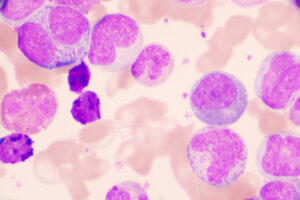Oncology
Chronic Lymphocytic Leukemia
Treatment-Associated Quality of Life in Chronic Lymphocytic Leukemia
Overview
Chronic lymphocytic leukemia (CLL) treatment can impact quality of life (QOL) in many different ways. Psychological aspects of treatment may be important influences in the patient’s overall experience.
How does CLL treatment affect QOL?
Jeff Sharman, MD
|
|
“Many patients are more willing to put up with side effects when they know that a treatment will allow them to stop therapy.”
QOL is important, and the duration of therapy has a significant impact on that. From a tolerability standpoint, the patient’s experience depends, to some degree, on whether they are receiving fixed-duration or indefinite therapy. The longer the patient is on therapy, the greater the potential for treatment-related adverse events. Many patients are more willing to put up with side effects when they know that a treatment will allow them to stop therapy. When someone is taking a medication every day, you want to optimize things rather than have the patient live with those side effects.
I do think that the second-generation Bruton tyrosine kinase inhibitors cause fewer side effects than the first-generation agent ibrutinib—and that is an important distinction. Acalabrutinib, for instance, has lower rates of arthralgias, hypertension, and atrial fibrillation, and zanubrutinib, which is currently being studied in CLL, also has lower rates of atrial fibrillation relative to ibrutinib. Acalabrutinib and zanubrutinib have not been compared head to head. Further, the tolerability of CLL treatment sometimes depends on the patient’s age. An older patient might experience more side effects from ibrutinib than a younger patient. So, you might have more flexibility with younger patients.
John C. Byrd, MD
|
|
“When you treat a patient effectively and their symptoms are reduced, they often feel like a human being again.”
The greatest improvements in QOL are observed in patients who are truly symptomatic from their disease to the point where they have had to cut back on work, family time, hobbies, and interests because of fatigue and/or other symptoms that are interfering with their lives. This is particularly evident in younger people who are in the midst of their professional lives; for example, they may have large lymph nodes that are bothering them and are elevating their anxiety. When you treat a patient effectively and their symptoms are reduced, they often feel like a human being again. They can put on a shirt and a tie by themselves, play golf on the weekends and walk the entire 18 holes, get their boat off of a trailer without having to stop and rest because they are so tired, or come home after work and play with their children or grandchildren. Those are some of the major QOL improvements that we may see with the use of any of the therapies that are prescribed for CLL.
Another aspect of QOL that is rarely discussed is related to the frequent CLL-associated infections that occur as the patient nears the time at which treatment will be required. A well-known pearl in caring for these patients is that, as you treat the CLL and reduce disease activity, and the immunosuppressive elements of the disease start to subside (particularly with BTK inhibitors), the time that patients spend with infections and feeling poorly is reduced. This improvement has a major beneficial effect on the psychological impact of CLL.
Ian W. Flinn, MD, PhD
|
|
“ . . . there are many psychological implications of watching and waiting, and then, ultimately, of making the decision to treat and deciding which therapy to choose.”
Sometimes the symptoms of CLL are so insidious that patients do not even realize that they did not feel well leading up to treatment until they start to feel very good after treatment. But there are also some psychological ramifications of treatment that patients face that I think are rarely discussed. For many, it is a great relief to be off therapy, but other patients may be uncomfortable with this, and it worries them a lot.
Additionally, the watch-and-wait strategy can also cause anxiety among patients with CLL. While messages on successful cancer treatment tend to emphasize the importance of early detection and early treatment to achieve better outcomes, CLL is one of the few exceptions to that rule. Many patients with CLL can successfully watch and wait and avoid the side effects associated with therapy; however, anxiety may develop in those who do not start treatment for their CLL right away. Further, the decision to start treatment after watch and wait can also be a source of stress for some individuals. After convincing patients that watch and wait is best and observing their disease activity for a long time, it can be very difficult to convince some patients to start therapy once it becomes necessary. Thus, there are many psychological implications of watching and waiting, and then, ultimately, of making the decision to treat and deciding which therapy to choose.
References
Al-Sawaf O, Gentile B, Devine J, et al. Health-related quality of life with fixed-duration venetoclax-obinutuzumab for previously untreated chronic lymphocytic leukemia: results from the randomized, phase 3 CLL14 trial. Am J Hematol. 2021;96(9):1112-1119. doi:10.1002/ajh.26260
Ghia P, Coutre SE, Cheson BD, et al. Impact of idelalisib on health-related quality of life in patients with relapsed chronic lymphocytic leukemia in a phase III randomized trial. Haematologica. 2020;105(10):e519-e522. doi:10.3324/haematol.2019.238808
Hillmen P, Eichhorst B, Brown JR, et al. First interim analysis of ALPINE study: results of a phase 3 randomized study of zanubrutinib vs ibrutinib in patients with relapsed/refractory chronic lymphocytic leukemia/small lymphocytic lymphoma [abstract LB1900]. Abstract presented at: European Hematology Association 2021 Virtual Congress; June 9-17, 2021.
Seymour JF, Gaitonde P, Emeribe U, Cai L, Mato AR. A quality-adjusted survival (Q-TWiST) analysis to assess benefit-risk of acalabrutinib versus idelalisib/bendamustine plus rituximab or ibrutinib among relapsed/refractory (R/R) chronic lymphocytic leukemia (CLL) patients [abstract 3722]. Abstract presented at: 63rd American Society of Hematology Annual Meeting and Exposition; December 11-14, 2021.
Sundaram M, Deering KL, Sharma D, Harshaw Q, Trudeau J, Barrientos JC. Health-related quality of life and treatment satisfaction in chronic lymphocytic leukemia (CLL) patients on ibrutinib compared to a reference group on other CLL treatments in a real-world US cross-sectional study. J Natl Compr Canc Netw. 2020;18(3.5). doi:10.6004/jnccn.2019.7471
Youron P, Singh C, Jindal N, et al. Quality of life in patients of chronic lymphocytic leukemia using the EORTC QLQ-C30 and QLQ-CLL17 questionnaire. Eur J Haematol. 2020;105(6):755-762. doi:10.1111/ejh.13503













